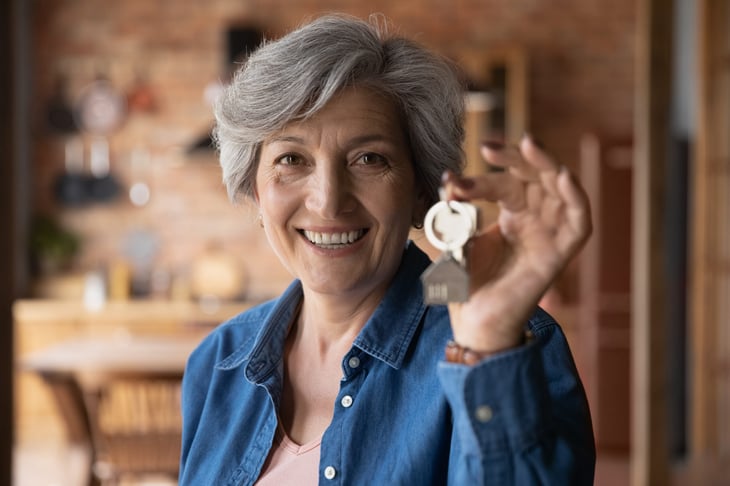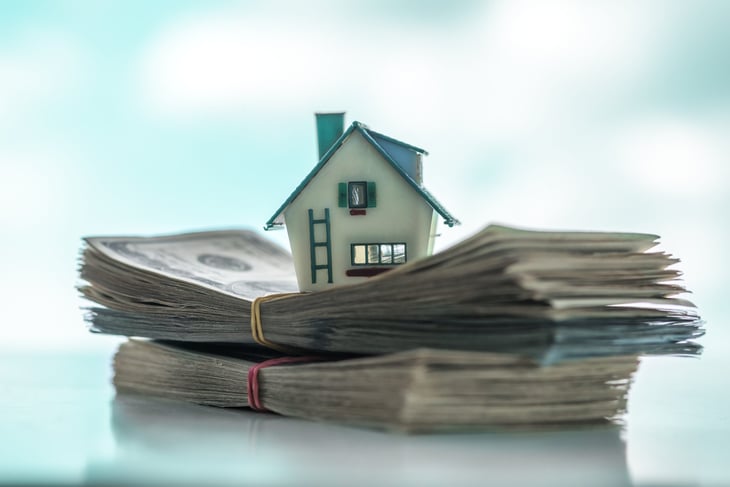
Editor's Note: This story originally appeared on NewRetirement.
If you own a home, it was likely one of the smartest lifelong financial moves you have ever made.
In addition to providing a safe haven for living your life, it is also a forced savings account and a hard asset that appreciates over time.
Your home has given you tax advantages, access to services in your community (particularly important if you had kids and sent them to public school), and perhaps it was a place to work during the pandemic.
And, your mortgage was a strategic financial decision that gave you leverage and flexibility.
Home Equity Is Still at Record Highs

Homeowners 62 and older have experienced blockbuster growth in home equity – now estimated at $12.39 trillion.
The housing market saw unprecedented growth over the last decade. However, it is important to note that values have seen modest drops (compared to long term growth) in some markets.
Should You Now Use Your Home Equity for Retirement?

The huge financial advantages your home can give continue into retirement – particularly if you have built up significant equity.
That money can now be converted into retirement income, cash for retirement expenses, financial leverage to improve your financial options, or funding for longevity, a long-term care need or other hard to predict events.
Explore the ways you might want to use your home equity for retirement. And, try them out on your own financial plan by running different scenarios using the NewRetirement Planner.
1. Turn Your Home Equity Into Retirement Income or Fund an Earlier Retirement

There are a wide variety of ways to use your home equity for regular retirement income.
Downsize and Turn Proceeds Into Income

Downsizing is usually the most efficient way to cash out your equity.
If you want to turn that money into retirement income, you might consider converting that money into income-producing assets such as rental property, bond ladders, dividend-producing investments, or a lifetime annuity.
Use the Physical Space

It has become somewhat common for people to rent out all or part of their home as a source of income.
- Could you rent out a room in your home to a long-term tenant?
- Have you considered house sharing? Remember the Golden Girls?
- What about just renting your home when you go on vacation? VRBO and Airbnb are really easy ways to turn your home into income.
- Have a pool? Swimply lets you rent it out by the hour.
Consider Monthly Income From a Reverse Mortgage

Somewhat controversial, a reverse mortgage is a specific type of home equity loan that is not paid back until you permanently leave your home.
One of the options on a reverse mortgage is receiving your loan amount as lifetime payments. A portion of your home equity is turned into lifetime income.
2. Convert the Equity Into Cash

Not everyone has saved quite enough for a secure retirement. However, your home equity is a real asset. You can convert the equity into money for retirement expenses.
Downsize and Use Your Equity

When you downsize and release your home equity you gain a liquid asset that you can invest or spend as desired and appropriate. You have many options for downsizing.
- Sell and move to a less expensive home or to a retirement community
- Sell and rent a place to live
- Try the tiny house trend
- Retire abroad
Get a Home Equity Loan

A home equity loan is a common way to access the money you have built up in your home.
However, it can sometimes be difficult to qualify for this loan in retirement due to income requirements and your need to make monthly payments against the loan.
This was a great option when interest rates were at rock bottom.
3. Keep Your Home Equity to Use as a Back-Up Plan

Perhaps one of the best ways to use your home equity is to hold on to it and only use it if you need to. For example, maybe you:
- Use your home equity if you live longer than expected and need additional assets
- Tap into your equity to fund a long-term care need
The only problem with waiting to tap the equity when you really need it is that it simply gets harder as you get older.
Relocating is more difficult as you age. And, financial transactions are more problematic for older people with physical and cognitive decline.
Home Equity to Fund Longevity

One of the most challenging aspects of retirement planning is predicting how long you will live. And, it can be stressful to think about outliving your assets.
Your home equity could be a backup plan for funding retirement if you (luckily) live longer than your assets.
Home Equity to Fund a Long-Term Care Need

Long-term care is tremendously expensive. And, you have no way of knowing if you will need it or not. So, reserving your home equity to fund this expense can be a smart strategy.
A Reverse Mortgage for Long-Term Care

If you can’t qualify for a home equity loan, but want to stay in your house and need access to cash, a reverse mortgage home equity line of credit might be a viable option.
When my grandmother suffered a stroke, she quickly ran through her assets. She was able to use a reverse mortgage line of credit to stay put and fund home care.
4. Use Home Equity to Increase Financial Flexibility

Maybe you don’t exactly need cash now. However, releasing home equity could increase your financial options.
Having access to a home equity line of credit, cash proceeds from the sale of your home or a reverse mortgage line of credit gives you flexibility.
Think of your home equity as another source of money to use strategically.
Here are a few ways to gain leverage and flexibility with your home equity.
Home Equity Loan Line of Credit

A home equity line of credit can be an efficient way to have access to your equity. You only pay interest on the money you use, not all of the funds that are available to you.
A line of credit just gives you financial options. It is a pool of money you can access if needed.
Let’s say college tuition is due this week. And, you had intended to sell stock to pay the bill. However, a big part of that account is tied up in a stock that is down.
If now is not the time to sell, it might be a better idea to let the stock recover and consider paying the bill out of a different pool of money, like your home equity line of credit.
Or, perhaps you do want to hold onto your home equity now and only use it for longevity or a long-term care need in the future. Setting up the home equity line of credit now gives you maximum flexibility and ensures you can access the funds if you need them.
Sell the Home and Retain the Cash

Of course, if you are ready to leave your home, downsizing and releasing the equity to cash is the most flexible option of all.
June has worked as a nurse for 25 years, and like many in the profession, she is worn out and ready to retire this year at 62. However, she doesn’t want to start Social Security so early, even though the income would make retirement more realistically affordable.
She is opting to tap her home equity by downsizing to an over 55 community. It’s a big plus that the complex has great amenities. The proceeds from the sale of her home will enable her to bridge the time period between stopping work and starting Social Security.
5. Preserving Home Equity for Your Heirs

For better or worse, many people want to retain their home equity to leave to their heirs. Every year billions of dollars are passed onto adult children via real estate.
And, recent research has found that people who expressed a stronger desire to leave an inheritance of at least $10,000 were much less likely to sell their homes before they died – with the intention that the house would be part, if not all, of that inheritance.
This held true even if the value of the home was in excess of the desired inheritance.





Add a Comment
Our Policy: We welcome relevant and respectful comments in order to foster healthy and informative discussions. All other comments may be removed. Comments with links are automatically held for moderation.